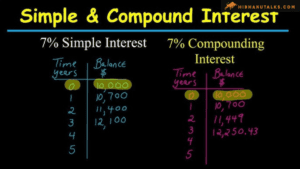
Performance Comparison: ETFs vs. Mutual Funds – Which is Right for You?
Contents
- 1 ETFs and Mutual Funds
- 1.1 Performance Comparison: ETFs vs. Mutual Funds – Which is Right for You?
- 1.1.1 Section 1:Overview of ETFs and Mutual Funds
- 1.1.2 Section 2: Performance Factors – How ETFs and Mutual Funds Generate Returns
- 1.1.3 Section 3: Historical Performance Comparison
- 1.1.4 Section 4: ETFs vs. Mutual Funds – Advantages and Disadvantages
- 1.1.5 Section 5: When to Choose ETFs Over Mutual Funds (and Vice Versa)
- 1.1.6 Conclusion
- 1.1.7 FAQs:
- 1.1.7.1 1.What are the main differences between ETFs and mutual funds?
- 1.1.7.2 2.Which generally performs better, ETFs or mutual funds?
- 1.1.7.3 3.Are ETFs more tax-efficient than mutual funds?
- 1.1.7.4 4.Do ETFs have lower fees than mutual funds?
- 1.1.7.5 5.Can I reinvest dividends with ETFs and mutual funds?
- 1.1.7.6 6.Are mutual funds less volatile than ETFs?
- 1.1.7.7 7.Is it possible to trade ETFs throughout the day?
- 1.1.7.8 8.How are ETFs and mutual funds impacted by market changes?
- 1.1.7.9 9.What types of investors should consider mutual funds?
- 1.1.7.10 10.What types of investors should consider ETFs?
- 1.2 ETFs and Mutual Funds
- 1.3 Comparing Costs: ETFs vs. Mutual Funds – Which Is More Cost-Effective?
- 1.1 Performance Comparison: ETFs vs. Mutual Funds – Which is Right for You?
ETFs and Mutual Funds
Performance Comparison: ETFs vs. Mutual Funds – Which is Right for You?
Section 1:Overview of ETFs and Mutual Funds
This section would define ETFs and mutual funds, including their investment structures, and explain the main differences between them:
- ETFs: Exchange-Traded Funds are bought and sold on stock exchanges, offering flexibility similar to individual stocks with often lower fees.
- Mutual Funds: Pooled investments managed by professionals, with shares priced at the close of each trading day, suitable for both passive and active management.


Section 2: Performance Factors – How ETFs and Mutual Funds Generate Returns
This section would discuss key performance factors that affect both ETFs and mutual funds:
- Market Exposure and Diversification: ETFs often track an index (passive management) with predictable performance tied to the underlying index, while mutual funds may pursue active management, aiming to outperform the market.
- Expense Ratios and Fees: Comparison of expense ratios (typically lower in ETFs) and fees associated with management and trading in mutual funds.
- Tax Efficiency: ETFs are often more tax-efficient due to their unique structure that limits capital gains taxes, while mutual funds distribute capital gains annually, which can impact returns.
Section 3: Historical Performance Comparison
A breakdown of historical data would show:
- Average Returns: A comparison of historical returns for ETFs and mutual funds, highlighting the tendency of actively managed funds to have higher fees, which can eat into performance.
- Volatility and Risk: Discussion of how ETFs, especially sector-based or leveraged ETFs, can be more volatile, while diversified mutual funds often take a more balanced approach.
- Dividend Reinvestment: Mutual funds often allow automatic dividend reinvestment, while ETFs might require manual reinvestment, which could impact long-term growth.
Section 4: ETFs vs. Mutual Funds – Advantages and Disadvantages
A side-by-side comparison in table format would work well here:
- ETFs Advantages: Lower fees, trading flexibility, tax efficiency.
- ETFs Disadvantages: Potential trading fees, price fluctuations within the day, limited to index performance for passive ETFs.
- Mutual Funds Advantages: Active management potential, easier dividend reinvestment, variety in asset allocation.
- Mutual Funds Disadvantages: Higher fees, potential tax implications, lack of intraday trading.


Section 5: When to Choose ETFs Over Mutual Funds (and Vice Versa)
This section would guide readers on selecting ETFs or mutual funds based on specific goals, such as:
- For Cost-Conscious Investors: ETFs may be better for those looking to minimize fees.
- For Long-Term Growth Seekers: Mutual funds with a focus on diversification and active management might offer more tailored strategies.
- For Day Traders or Frequent Investors: ETFs allow intraday trading, making them ideal for frequent adjustments.
Conclusion
A brief summary would reaffirm the points made, emphasizing that both ETFs and mutual funds have unique benefits. Investors should consider their financial goals, risk tolerance, and investment horizon when choosing between them.
FAQs:
1.What are the main differences between ETFs and mutual funds?
A. ETFs are traded on exchanges and typically have lower fees, while mutual funds are pooled investments managed actively or passively with trades processed at day’s end.
2.Which generally performs better, ETFs or mutual funds?
A. Performance depends on the specific fund and market conditions; index-tracking ETFs may have lower fees but won’t outperform the market, while some mutual funds aim to.
3.Are ETFs more tax-efficient than mutual funds?
A. Yes, ETFs often have a tax advantage because they don’t usually distribute capital gains to shareholders.
4.Do ETFs have lower fees than mutual funds?
A. Generally, yes. ETFs usually have lower expense ratios than actively managed mutual funds, making them more cost-effective.
5.Can I reinvest dividends with ETFs and mutual funds?
A. Mutual funds often offer automatic reinvestment, while ETF reinvestment depends on your brokerage platform.
6.Are mutual funds less volatile than ETFs?
A. It depends on the mutual fund’s strategy, but broad-market mutual funds might show less intraday volatility compared to sector-specific or leveraged ETFs.
7.Is it possible to trade ETFs throughout the day?
A. Yes, ETFs can be traded like stocks during market hours, unlike mutual funds that only process transactions at the close.
8.How are ETFs and mutual funds impacted by market changes?
A. Both respond to market shifts, but actively managed mutual funds may react differently based on management decisions, while ETFs track their benchmark.
9.What types of investors should consider mutual funds?
A. Long-term investors who value professional management and prefer set-it-and-forget-it strategies may find mutual funds more suitable.
10.What types of investors should consider ETFs?
A. ETFs may be ideal for those looking for flexible, cost-effective options with the ability to trade throughout the day.
ETFs and Mutual Funds
Comparing Costs: ETFs vs. Mutual Funds – Which Is More Cost-Effective?





















Post Comment